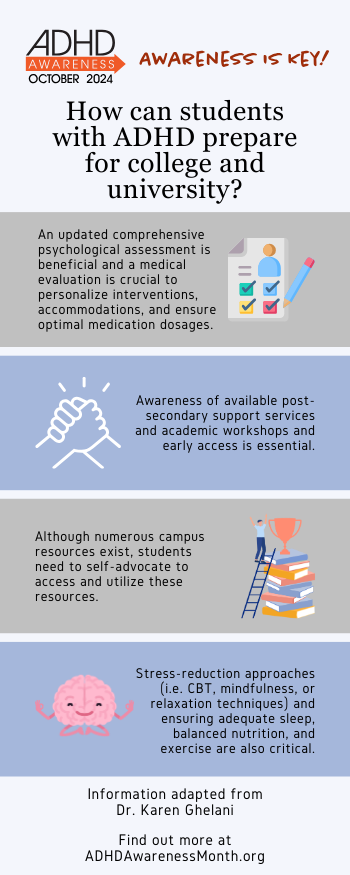How can we ensure students with ADHD can thrive and survive in higher education?
College or university can be daunting for students with ADHD, who must manage greater independence, academic rigor, and social interactions. Providing individualized support, ensuring timely access to resources, and cultivating self-advocacy are essential strategies to help them thrive and achieve their educational goals.

Transitioning to college or university is a major life shift for students with Attention Deficit Hyperactive Disorder (ADHD). They face increased expectations for responsible independence, managing rigorous academic requirements, and balancing social demands. ADHD symptoms along with challenges such as deficits in executive functions (i.e., organization; time management), anxiety, and mood disorders can significantly impact their academic progress.
Preparation for campus life ideally begins earlier in high school. However, COVID-related disruptions left many students without essential training in executive function and support for managing co-occurring conditions. There are, however, proactive steps that can overcome some of the obstacles.
Given the diverse nature of ADHD among students, an updated comprehensive psychological assessment is beneficial and a medical evaluation is crucial to personalize interventions, accommodations, and ensure optimal medication dosages.
Awareness of available post-secondary support services and academic workshops and early access is essential. Many colleges/universities offer a summer program to empower students with ADHD by enhancing their academic, social, and life skills for campus living. Although numerous campus resources exist, the student needs to self-advocate to access and utilize the resources.
A binder containing a description of diagnoses, medications, and learning strengths and challenges encourages self-advocacy. The binder helps the student communicate their needs and request accommodations effectively and may list important questions for counselors and professors.
Regularly scheduled appointments with counselors can help students review progress, program changes (such as reducing course load), and access academic and stress management resources.
General accommodations include extra time, quiet spaces for writing exams, and note-taking services. Key academic strategies focus on enhancing motivation, overcoming procrastination, improving organization, and mastering effective time management.
Students are encouraged to use digital or physical planners, break tasks into manageable steps (e.g., SMART goals), employ time management techniques (e.g., Pomodoro Technique; Eisenhower Matrix), and participate in peer-mediated study groups for active learning.
Exploring different stress-reduction approaches such as Cognitive Behavioral Therapy (CBT), mindfulness, and relaxation techniques can be beneficial. Ensuring adequate sleep, balanced nutrition, and exercise is also critical.
With effective strategies and support, students with ADHD can succeed and thrive in higher education.
About the Author

Dr. Karen Ghelani is a Psychologist in Toronto and Director of the Chrysalis Centre. She is currently on the Advisory Board for CADDRA. She has a special interest in helping individuals with ADHD across the life span.
